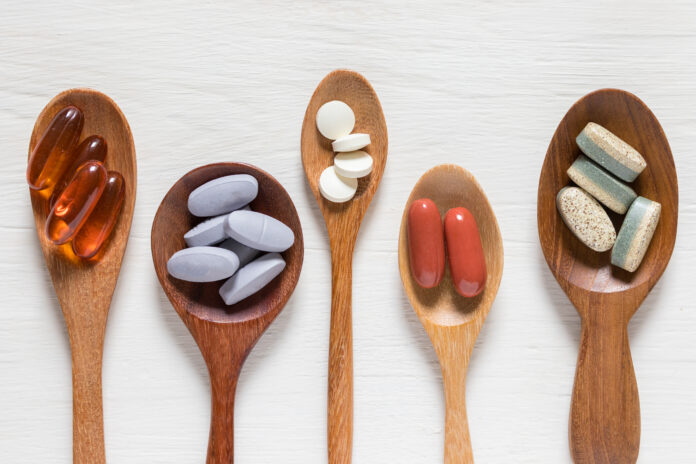By United Supermarkets’ Registered Dietitians Lifestyle Desk
The supplement industry is huge, so how do you know what to take? Or should you take anything at all? These are only a couple of the loaded questions consumers face on the daily when facing the supplement aisles.
The top two things I want you to take away from this are this — know your blood work numbers and talk with your doctor before taking anything and speak with a Registered Dietitian who can recommend a reputable brand with third party testing and science behind it.
The scenario is all too familiar: you’re standing in the supplement aisle looking at vitamin D fully knowing that your lab levels are totally fine but yet you throw it in your cart because of a random health article you read.
Let’s stop right here and rewind that scenario – if your vitamin D lab levels are fine you probably don’t need that singular supplement. A multivitamin, 3 servings of dairy and about 15-20 minutes of sunshine could do the trick in sustaining a healthy level of vitamin D.
So the takeaway here is to know your numbers before you start supplementing with anything. Not only will it help ease your brain and your wallet but it can also help in creating a food first mentality when consuming specific nutrients. Spoiler alert though, it’s more about the diet as a whole than consuming something specific.
Let’s say you do need to take a supplement and on the shelf there are about 20 different brands, dosages, flavors, and pairings of that singular one you need. How do you choose? Well, you can ask a Registered Dietitian (RD) to help find a brand that has 3rd party studies to back up the claims made on the bottle as well as your doctor.
Since the supplement industry isn’t FDA regulated it’s challenging to weed through the science alone, so if you can’t find a Registered Dietitian head to the company’s website for their research. RD’s can also help you with what to take with (or without) said supplement since it may work in the body better that way.
All of that being said, we want you to be an informed consumer! We are here to help you demystify the aisles one by one and help you get the most bang for your buck nutritionally.
Creamy Butternut Squash Soup
Original Recipe by: Christina Anania, @evolvewithtee.
What You Need
2 T avocado oil
1 onions (diced)
1 t garlic (minced)
2 celery stalks
2 C butternut squash (cubed)
2 scoops Vital Proteins Collagen Peptides
2 t nutmeg
2 t paprika
Salt and pepper to taste
3 C pumpkin puree
2 C coconut milk
1/2 C boiled water
Optional Toppings: Pumpkin seeds, nutmeg, avocado oil, coconut milk, pepper, chili flakes
How It’s Made
1. In a large pot, heat the avocado oil on medium heat and add in the onions, garlic, celery stalk and butternut squash. Cook for 10-12 minutes or until soft.
2. Mix in the Collagen Peptides, nutmeg, paprika, and salt and pepper. Mix together with the vegetables until well-combined.
3. Add in the pumpkin puree, coconut milk and boiled water and cook for 5 minutes.
4. Scoop the mixture into a blender and puree it until creamy and smooth.
5. Once all of the vegetables and puréed, add the soup back into the pot and cook for 3-5 minutes on medium heat, or until it starts to bubble.
6. Scoop the butternut squash soup into bowls, top with additional toppings and enjoy!




